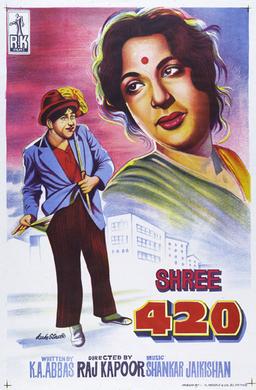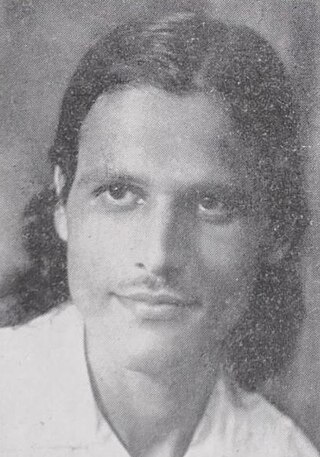Hindi literature includes literature in the various Hindi languages which have different writing systems. Earliest forms of Hindi literature are attested in poetry of Apabhraṃśa like Awadhi, Magadhi, Ardhamagadhi and Marwari languages. Hindi literature is composed in three broad styles- गद्य (Gadya-prose), पद्य( Padya- poetry) and चम्प्पू In terms of historical development, it is broadly classified into five prominent forms (genres) based on the date of production. They are:

Mahadevi Verma was an Indian Hindi-language poet, essayist, sketch story writer and an eminent personality of Hindi literature. She is considered one of the four major pillars of the Chhayawadi era in Hindi literature. She has been also addressed as the Modern Meera. Poet Nirala had once called her "Saraswati in the vast temple of Hindi Literature". Varma had witnessed India both before and after independence. She was one of those poets who worked for the wider society of India. Not only her poetry but also her social upliftment work and welfare development among women were also depicted deeply in her writings. These largely influenced not only the readers but also the critics, especially through her novel Deepshikha.

Rambola Dubey popularly known by his title Tulsidas or Goswami Tulsidas, was a Vaishnava Hindu saint and poet, renowned for his devotion to the deity Rama. He wrote several popular works in Sanskrit, Awadhi, and Braj, but is best known as the author of the Hanuman Chalisa and of the epic Ramcharitmanas, a retelling of the Sanskrit Ramayana based on Rama's life in the vernacular Awadhi.
Nadiad is a city in the state of Gujarat, India and the administrative centre of the Kheda district. The city is managed by the Nadiad Municipality. It is known for the Santram Mandir, the Mai Mandir, the historic Swaminarayan temple built in 1824, and the Anand and Hari Om Ashram. Nadiad is also where Shrimad Rajchandra composed Shri Atmasiddhi Shatra, a 142 verse spiritual treatise in 1895. Nadiad is located 90 kilometres (56 mi) away from Gandhinagar, the capital of Gujarat. It has a major railway junction and is a main station on the Ahmedabad-Mumbai route. It is the birthplace of Sardar Vallabhbhai Patel, the first Deputy Prime Minister of India. Nadiad Municipality was Founded in 1866.

Maithili Sharan Gupt was one of the most important modern Hindi poets. He is considered one among the pioneers of Khari Boli poetry and wrote in Khari Boli dialect, at a time when most Hindi poets favoured the use of Braj Bhasha dialect. He was a recipient of the third highest Indian civilian honour of Padma Bhushan. For his book Bharat-Bharati (1912), widely quoted during India's freedom struggle, he was given the title of Rashtra Kavi by Mahatma Gandhi.

Ramdhari Singh, known by his pen name Dinkar, was an Indian Hindi language poet, essayist, freedom fighter, patriot and academic. He emerged as a poet of rebellion as a consequence of his nationalist poetry written in the days before Indian independence. His poetry exuded Veer Rasa, and he has been hailed as a Rashtrakavi and Yuga-Chāraṇa on account of his inspiring patriotic compositions. He was a regular poet of Hindi Kavi Sammelan and is hailed to be as popular and connected to poetry lovers for Hindi speakers as Pushkin for Russians.
Trivedi is a family name from northern and western India reflecting the mastery over three of the four vedas. In Sanskrit Trivedi means 'one that knows the three Vedas’, from tri = 'three' + veda ‘(sacred) knowledge' leading to vedi = 'to see'. Similar family names are Chaturvedi and Dwivedi. They are also known as Tripathi and Tiwari in some parts of north India.
Chhindwara is a city in India and a Municipal Corporation in Chhindwara district in the Indian state of Madhya Pradesh. The city is the administrative headquarters of Chhindwara District. Chhindwara is reachable by rail or road from adjacent cities Betul, Jabalpur and Nagpur. The nearest airport is in Nagpur (130 km); however there is a small airport located in the city which is not serviceable for passenger planes.
Modasa is a town and a municipality in Aravalli district in the Indian state of Gujarat.

Shree 420 is a 1955 Indian Hindi comedy-drama film directed and produced by Raj Kapoor from a story written by Khwaja Ahmad Abbas whose use of Shree with the negative connotations of 420 caused controversy. The film stars Nargis, Nadira, and Kapoor. The number 420 refers to Section 420 of the Indian Penal Code, which prescribes the punishment for the offence of fraud; hence, "Mr. 420" is a derogatory term for a fraud. The film centers on Raj Kapoor, a poor but educated orphan who comes to Bombay with dreams of success. Kapoor's character is influenced by Charlie Chaplin's "little tramp", much like Kapoor's character in his 1951 Awaara. The music was composed by the team of Shankar Jaikishan, and the lyrics were penned by Shailendra and Hasrat Jaipuri.
Pratapgarh, also called Belha or Bela Pratapgarh, is a town and municipality in the state of Uttar Pradesh in India. It is the administrative headquarters of Pratapgarh district, part of the Prayagraj division.
Dwivedi or Duvedi or Diwedi or Dubay or Dubey or Dave or Dube or is an Indian surname meaning versed in two Vedas. The surname is used by Brahmins in northern India. Dubey Title Are also called Dwivedi

Kavi Pradeep, was an Indian poet and songwriter who is best known for his patriotic song "Aye Mere Watan Ke Logo" written as a tribute to the soldiers who had died defending the country during the Sino-Indian War.

The Hanuman Chalisa is a Hindu devotional hymn (stotra) in praise of Hanuman. It is an Awadhi language text attributed to Tulsidas, and is his best known text apart from the Ramcharitmanas. The word "chālīsā" is derived from "chālīs", which means the number forty in Hindi, as the Hanuman Chalisa has 40 verses.
Bapna also spelt Bafana' is an Indian Jain community, and also the surname used by this community. The name is derived from Bahufana and Bafanha. They were Rajput and embraced Jainism. Bafnas are also known as Bapnas, Baphana.

Chandraprakash Dwivedi is an Indian actor, film director and screenwriter, who is best known for directing the 1991 television epic Chanakya in which he also played the title role of the political strategist Chanakya and an inspiration for millions. He has also directed the 1996 television series Mrityunjay which is based on the life of Karna, one of the main characters of the epic Mahabharata, and he won a Screen Videocon Best Director award for the same. His other major work is the 2003 film Pinjar, a tragic love story set amidst the Hindu-Muslim tensions during the Partition of India, based on Amrita Pritam's novel of the same name. He also wrote and directed Akshay Kumar starrer Samrat Prithviraj (2022). he was honoured by the Government of India with the Padma Shri, the fourth-highest civilian honour of the country, in 2022

Ram Charan (1720–1799)) is the Rajasthani Hindu guru, inspirator of a religious tradition called Ramsnehi Sampradaya or Ramdwara. He initiated and illustrated Nirguna (absolute) Bhakti, although he was not against Saguna Bhakti. He initiated and tried to eliminate "show", blind faith, hypocrisy and misled existing in the Hindu religion and preferred to worship the 'name of God', Rama, over God, to not get involved in false "show" activities.

Rewa Prasad Dwivedi was a Sanskrit scholar, poet, writer, teacher, and critic. His original works include poetry as epics and lyrics, plays, and prose. He wrote the new literature under the pseudonym "sanatana", meaning 'the eternal'. He is also known as 'Acharya' Dwivedi.

Dr. Haldhar Nag is a Sambalpuri poet and writer from Bargarh, Odisha, India. Popularly known as "Lok Kabi Ratna". He was awarded Padma Shri, the fourth highest civilian award of India by Government of India in 2016. He was born in a poor family of Ghens. He is best known for his work Kavyanjali, an anthology of English translation of Nag's selected poetry which was launched on 2 October 2016. Recently he released his 3rd volume of work on Kavyanjali. In 2019, Haldhar Nag was awarded Doctorate Degree by Sambalpur University. In the year 2020, Professor Jaishankar Babu, Head of the Department of Hindi, Pondicherry University, organized a two-day international seminar under the guidance of its Vice-Chancellor Professor Gurmeet Singh, in which "Haldhar Nag Ka kavya- Sansar" translated into Hindi from Sambalpuri by renowned Hindi writer-transaltor Dinesh Kumar Mali was released and there was an intensive discussion on his poems by the participants from India and abroad. In the year 2021, under the joint editorship of Professor Jaishankar Babu and translator Dinesh Kumar Mali, the book "'Haldhar ke Lok-sahitya par vimarsh'" and the book "Ramayan prasangon par Haldhar ke Kavya aur yugin Vimarsh " translated by Dinesh Kumar Mali based on Ramayana contexts. published from Pandulipi Prakashan, New Delhi.The popularity of these books Hindi Belt honoured Haldhar Nag with Dr Ram Manohar Tripathi Lok Seva Samman on the Silver Jubilee eve of Acharya Mahavir Prasad Dwivedi Smruti Sanrakshan Abhiyan under the leadership of Gaurav Awasthi in the auditorium of Firoz Gandhi College, Rae Bareli on date 12.11.22. The Indira Gandhi National Open University (IGNOU) has included a review of the literary creations of Padma awardee and noted poet Haldhar Nag. According to sources, students pursuing a Master of Arts (MA) in Folklore and Culture Studies will study folk literature by Nag in a course component titled, ‘Folklore: Canon, Multimediality, Interdisciplinarity, and Social Epistemology’ in their second year. The course book has described Nag as the true representative of orality in the present times. His creations have been reviewed in the category, ‘Case study of orality from East India’.“Nag has based his poems on his surroundings. Folklorists and folklore researchers are vulnerable to multiple challenges with regards to archiving, documentation, and dissemination of the folk material,” TOI reported writer Nandini Sahu, who has designed the MA course for IGNOU, as saying. Notably, writer Dinesh K Mali has written a chapter for the MA programme on Nag’s poetry.'

Shri Babu Ram Paliwal was an accomplished poet and writer in Hindi and Braj languages. He was best known for his early work ‘Karyalaya Nirdeshika’ for which he received awards by the Government of India and Uttar Pradesh Government. He contributed as Hindi expert in the Ministry of Home Affairs and Ministry of Communications, the Government of India. He made significant contributions towards the development of Hindi language. He was the producer of the 'Braj-Bharati' program of Aakashwani, All India Radio, New Delhi. He had a multifaceted personality and had extensive knowledge of Hindi, Braj and English languages.











